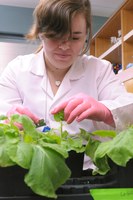UofL receives $5.5 million grant from Helmsley Charitable Trust to support innovative cancer research
John Codey (right) of the Helmsley Charitable Trust talks with Dr. Nobuyuki Matoba about his work into finding a vaccine to prevent cholera, which in turn would prevent some cases of colon cancer.
LOUISVILLE, Ky. – Noting the significant progress in drug and vaccine development over the past three years, the Leona M. and Harry B. Helmsley Charitable Trust, has provided a three-year, $5.5 million grant to the James Graham Brown Cancer Center at the University of Louisville to develop new treatments and vaccines for various forms of cancer.
“Seven years ago, we partnered with Owensboro Health to explore the novel idea of plant-based pharmaceuticals and vaccines in the treatment and prevention of cancer,” said Dr. James R. Ramsey, president of the University of Louisville. “Our team showed enough promise that the Helmsley Charitable Trust provided more than $3 million in research support in 2010. Today’s grant, with Dr. Donald Miller, director of the James Graham Brown Cancer Center, as the principal investigator, demonstrates the confidence the leaders of the trust have in the work that is being accomplished. We are extremely grateful to the trust for its support and we look forward to further opportunities to partner.”
The new funding will help UofL researchers move into clinical trials vaccines for cervical and colon cancer. Additionally, researchers will further develop plant-based drug delivery systems to allow for higher concentrations of anticancer drugs to be transported directly to human tumors, as well as to increase a tumor’s sensitivity to anticancer treatment. The plants involved in the research range from tobacco to soybeans to colored berries.
 “The work of Dr. Miller and his team has the potential to significantly impact health around the world,” said John Codey, a trustee with the Helmsley Charitable Trust. “They are focusing on finding much less expensive methods for delivering vaccines and medications so that these treatments are accessible to even the poorest of countries. We are pleased to continue to support efforts that have the potential to relieve suffering for a significant segment of people around the world.”
“The work of Dr. Miller and his team has the potential to significantly impact health around the world,” said John Codey, a trustee with the Helmsley Charitable Trust. “They are focusing on finding much less expensive methods for delivering vaccines and medications so that these treatments are accessible to even the poorest of countries. We are pleased to continue to support efforts that have the potential to relieve suffering for a significant segment of people around the world.”
The Helmsley Charitable Trust also has funded research at UofL focused on helping people with spinal cord injuries regain function. To date, the Helmsley Charitable Trust has provided UofL with nearly $15 million in research funding.
“Federal funding for research continues to be more and more competitive, with fewer researchers receiving funds each year,” said Dr. David L. Dunn, executive vice president for health affairs at UofL. “The resources the Helmsley Charitable Trust provides enables our internationally renowned researchers to continue with their groundbreaking work that has the potential to transform the lives of people worldwide. It is through these significant partnerships that innovative health care approaches are possible.”
“Owensboro Health’s cancer research partnership with the University of Louisville has allowed us to help lead the charge with groundbreaking projects in the fight against cancer. This grant has been key in allowing us to work toward taking solutions from the laboratory bench to the patient bedside,” said Philip Patterson, president and CEO of Owensboro Health. “Since its creation in 2007, the team at the Owensboro Cancer Research Program at our Mitchell Memorial Cancer Center has made tremendous strides. We are grateful for the renewed support from the Helmsley Charitable Trust.”
Under Miller’s leadership, researchers will move an oral cervical cancer vaccine from preclinical trials into pre-investigational new drug studies. These studies reduce the amount of time it takes to move a vaccine from the laboratory to use in people. The vaccine uses a specific protein (L2 minor capsid) to create a broad response to attack HPV, the virus responsible for the vast majority of cervical cancer, and should be ready to enter clinical trials by early 2015. This project is being led by Dr. Kenneth Palmer.
A second cervical cancer vaccine is being developed by two researchers who were part of the team that created the world’s first cervical cancer vaccine. Drs. Bennett Jenson and Shin-Je Ghim are working on a vaccine that is biosimilar to the original vaccine, but produced in tobacco plants. This effort also will enter into the pre-IND phase over the next two years.
 Drs. Nobuyuki Matoba and Palmer are developing an oral cholera vaccine that may prove to be a way to prevent colon cancer. The gastrointestinal issues associated with cholera create a favorable environment for the development of colon cancer, thus, preventing cholera can also prevent colon cancer. The goal is for this vaccine to enter clinical trials in late 2014.
Drs. Nobuyuki Matoba and Palmer are developing an oral cholera vaccine that may prove to be a way to prevent colon cancer. The gastrointestinal issues associated with cholera create a favorable environment for the development of colon cancer, thus, preventing cholera can also prevent colon cancer. The goal is for this vaccine to enter clinical trials in late 2014.
For several years, Dr. Huang-Ge Zhang has been exploring the anticancer properties of tiny particles called plant exosomes. Animal studies suggest that exosomes may be able to play a role in the treatment or prevention of colon, breast and lung cancer. Zhang was the first to demonstrate that exosomes existed in plants and plans to demonstrate that they could be used to deliver higher concentrations of anticancer drugs directly to human tumors.
Dr. Ramesh Gupta has uncovered that certain compounds within colored berries increase the anticancer effect of chemotherapy drugs. This has the potential to enable smaller amounts of the drugs to be used, but with the same or more beneficial effects.
“Our goal is to cure cancer in people, not in mice,” Miller said. “The Owensboro Cancer Research Program is a tremendous tool for reaching that goal, not just locally or regionally, but worldwide. Through plant-based pharmaceuticals, we will be able to provide low-cost vaccines and anticancer medications that make them accessible to even the poorest of nations. To have an organization like the Helmsley Charitable Trust partner with us will enable us to move toward our goal at a much quicker pace.”
UofL’s comprehensive campaign is scheduled to wrap up June 30 after already surpassing its $1 billion goal. Charting our Course formally launched in 2010 with the funds raised designated for academic support, scholarships and programs for students; faculty recruitment, research and professional development; infrastructure enhancements and upkeep of athletic facilities; and support of the university's academic units and libraries. More than 75,000 donors throughout the world have invested in the future of the University of Louisville.
About the Helmsley Charitable Trust
The Leona M. and Harry B. Helmsley Charitable Trust aspires to improve lives by supporting effective nonprofits in health, place-based initiatives, and education and human services.Since 2008, when the Trust began its active grantmaking, it has committed more than $1 billion to a wide range of charitable organizations.For more information on the Trust and its programs, visit www.helmsleytrust.org.
 Facebook
Facebook Twitter
Twitter Linkedin
Linkedin